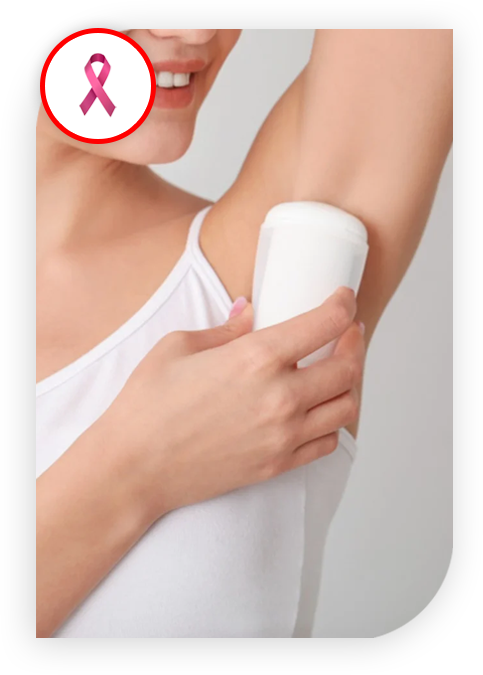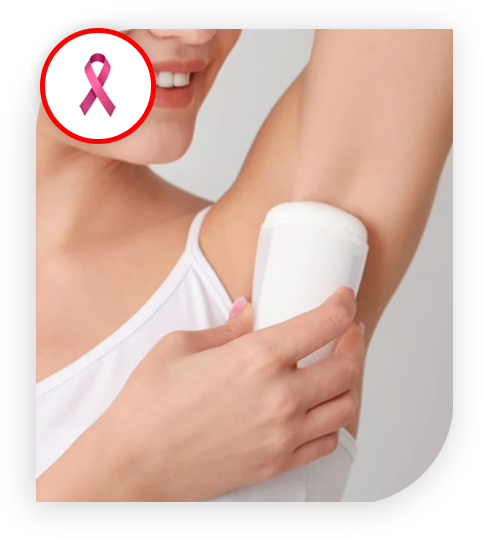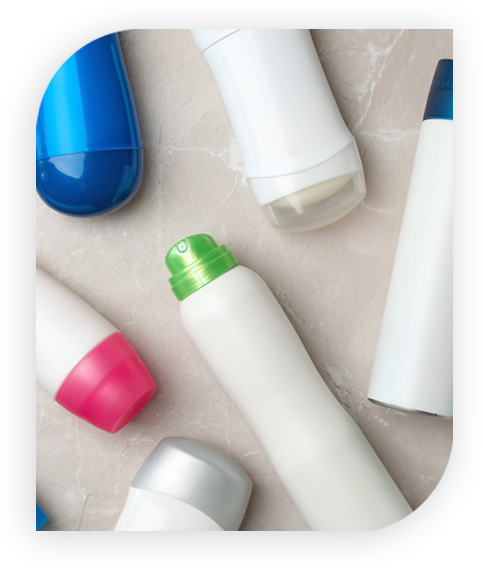Deodorant Can Cause Serious Health Problems
Share This Article

Deodorants and Breast and Other Cancers

It’s the bacteria on your skin breaking down sweat that produce an odor. It’s important to know that sweating is good because it is one of the body’s main way to get rid of harmful substances (detox). The toxins that our bodies are trying to flush out go to our lymph system.
The lymph systems works by trapping the bad toxins and flushing it out frequently through our armpits. When the glands in our armpits are blocked, the upper corner of the breasts, are near the armpits, and that is often the site of developing cancerous cells and tumors.
Cancer is also frequently spread throughout the body when cancerous cells break off from a tumor and travel to another location in the body through the lymph system.
Evidence About Deodorants and Cancer
A study done at Reading University in the UK suggests a link between the usage of antiperspirants and breast cancer. They say, the strongest evidence of this is the rise of breast cancer cases in men, one of the largest users of antiperspirant deodorants.
There have been a number of studies done to specifically look at whether deodorants and antiperspirants increase breast cancer risk and Alzheimer’s disease, but unfortunately the findings are mixed. There simply needs to be more studies completed before a conclusive verdict is reached in the medical community.
In any case there is ample evidence that ingredients in many deodorants are linked to development and fertility complications, allergies, irritation, and toxicity issues in different body systems. The variety of chemical ingredients is generally linked to a diversity of health concerns.
Deodorants are of concern because they are used every single day, and build-up becomes inevitable. Knowing that many of the ingredients found in the deodorant that you use every day, and leave on your body for the full day are toxic carcinogens and may cause major health problems should make you want to look for alternatives.
There have been a number of studies done to specifically look at whether deodorants and antiperspirants increase breast cancer risk and Alzheimer’s disease, but unfortunately the findings are mixed. There simply needs to be more studies completed before a conclusive verdict is reached in the medical community.
In any case there is ample evidence that ingredients in many deodorants are linked to development and fertility complications, allergies, irritation, and toxicity issues in different body systems. The variety of chemical ingredients is generally linked to a diversity of health concerns.
Deodorants are of concern because they are used every single day, and build-up becomes inevitable. Knowing that many of the ingredients found in the deodorant that you use every day, and leave on your body for the full day are toxic carcinogens and may cause major health problems should make you want to look for alternatives.
Harmful Ingredients in Deodorants
1
Aluminum: This is a primary ingredient in many popular antiperspirants. In 1993, the World Health Organization link this ingredient to Alzheimer's. The Agency for Toxic Substances and Disease Registry said that exposure to high levels of Aluminum may result in neurological and respiratory problems. It has also been linked to a number of other health issues.
- Seizures
- Breast Cancer
- Down’s Syndrome
- Alzheimer’s Disease
- Bone Formation Disorders
- Kidney Problems
2
Synthetic Fragrance: Most scented deodorants have “fragrance” or “perfume” listed as an ingredient. Many say synthetic fragrances, which is impossible to know what it includes because it is considered a trade secret and under current trade law it does not have to be disclosed.
This is a serious health problem, because more than 90 percent of the chemicals in synthetic fragrances are derived from petrochemicals, that include the cancer linked benzene derivatives, aldehydes, phthalates, and many other known toxins that are capable of causing cancer, birth defects, nervous-system disorders and allergies - some of which are cited on the EPA’s hazardous waste list.
For this reason we recommend staying away from any deodorant or other personal care product that lists “fragrance” on their label without disclosing the ingredients that are included.
This is a serious health problem, because more than 90 percent of the chemicals in synthetic fragrances are derived from petrochemicals, that include the cancer linked benzene derivatives, aldehydes, phthalates, and many other known toxins that are capable of causing cancer, birth defects, nervous-system disorders and allergies - some of which are cited on the EPA’s hazardous waste list.
For this reason we recommend staying away from any deodorant or other personal care product that lists “fragrance” on their label without disclosing the ingredients that are included.
3
Parabens: This is a group of chemicals often used as a preservative to increase the shelf life of deodorants, moisturizers, face and body cleansers, sunscreens, shaving gels, toothpaste, makeup, shampoos, and conditioners. Common parabens are methyl paraben, propyl paraben, butyl paraben, ethyl paraben and many alternate names. These are known to disrupt the hormone function, by binding estrogen receptors in the body, which has an effect that is linked to an increased risk of breast cancer and reproductive toxicity.
4
Triclosan: This may have an estrogenic effect. It has been banned in antibacterial soaps but still may be found in deodorants, shampoos, body wash, and certain toothpaste brands. In addition to being classified as a pesticide by the FDA and a probable carcinogen by the EPA, triclosan has been linked to a number of different problems including disruption of the endocrine system (particularly thyroid function), increased risk of cancer, and increased hay fever and allergy symptoms.
5
Propylene Glycol: This is used to increase absorption and helps keep substances from drying out. It was originally formulated to be used as an anti-freeze. Propylene glycol is a neurotoxin and skin irritant. It could
How To Choose a Deodorant
Replacing deodorants is tough. Many natural deodorants also include toxic ingredients. Natural deodorants are not normally as strong as “normal” ones and antiperspirants. But we have found a fantastic alternative.









Leave a Reply